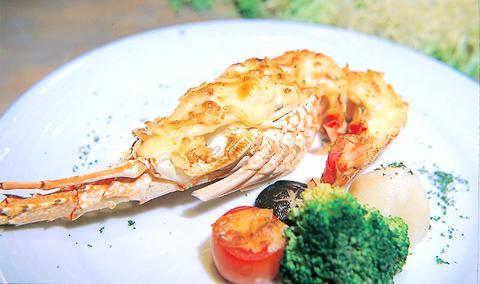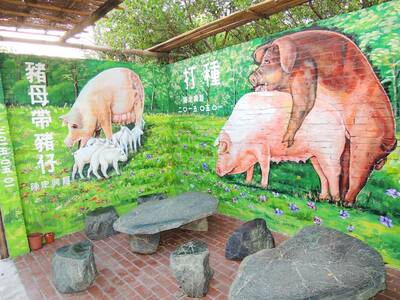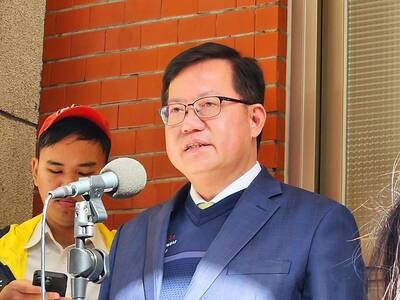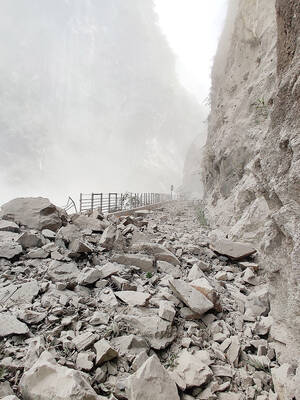It is rather difficult to categorize La Tarradoro. An extension of the Cafe Piazza, which has already established a reputation for quality coffees and cakes, the interior retains the feel of a coffee shop, even though a substantial menu of meat and fish dishes has been added.
Although it bills itself as a European restaurant, this restriction only applies to the a la carte menu. For its business lunch, which packs people in during the week, the menu is constantly changing. "We serve a business community, and we want to feel that they can come in day after day without getting bored," said owner Wang Hsiu-chu (

PHOTO: IAN BARTHOLOMEW, TAIPEI TIMES
While the lunch menu is good, it is nothing out of the ordinary, and the high point comes with the coffee or tea, which is excellent. Wang, who as a member of Holen Freezer Co, a professional food service and equipment importer, has been responsible for training many aspiring coffee shop owners, is something of an expert in this field, and pulls a very fine espresso. La Tarradoro also serves Pickwick Tea, (rather than the ubiquitous Liptons), and the difference is much appreciated by tea lovers.
The cakes served at La Tarradoro derive from the Cafe Piazza range, which are a fine mix of French and Japanese styles prettily presented but richer and not so sweet as you find in the usual Japanese bakeries. Confections such as the coffee, caramel and brandy mousse cake or the red currant cheesecake are innovative and exciting.
While it is possible to order a la carte at lunch, the evening is probably a better time to settle down to enjoy the toothsome selection of grilled meats, all very reasonably priced. For the budget conscious, you can pick up a very nice grilled pork filet with mushroom sauce along with a soup (the pumpkin is very good), coffee and unlimited salad for just NT$380. Various cuts of beef are priced in the mid-NT$500s, often with the addition of a seafood cocktail or escargots as an appetizer. A full surf and turf is just NT$720. While not wildly fancy, the meat is excellent, and cannot be faulted at the price, and while you can't place the food either by region or country, it maintains a general Mediterranean flavor.
All this can be washed down with a bottle of the restaurant's reasonably priced wines. Currently, a Linderman's Semillon Chardonnay will only put you back NT$600, which is an extraordinarily good value, as most establishments don't usually let even the most vinegary stuff go for less than NT$1,000.

May 6 to May 12 Those who follow the Chinese-language news may have noticed the usage of the term zhuge (豬哥, literally ‘pig brother,’ a male pig raised for breeding purposes) in reports concerning the ongoing #Metoo scandal in the entertainment industry. The term’s modern connotations can range from womanizer or lecher to sexual predator, but it once referred to an important rural trade. Until the 1970s, it was a common sight to see a breeder herding a single “zhuge” down a rustic path with a bamboo whip, often traveling large distances over rugged terrain to service local families. Not only

By far the most jarring of the new appointments for the incoming administration is that of Tseng Wen-tsan (鄭文燦) to head the Straits Exchange Foundation (SEF). That is a huge demotion for one of the most powerful figures in the Democratic Progressive Party (DPP). Tseng has one of the most impressive resumes in the party. He was very active during the Wild Lily Movement and his generation is now the one taking power. He has served in many of the requisite government, party and elected positions to build out a solid political profile. Elected as mayor of Taoyuan as part of the

Moritz Mieg, 22, lay face down in the rubble, the ground shaking violently beneath him. Boulders crashed down around him, some stones hitting his back. “I just hoped that it would be one big hit and over, because I did not want to be hit nearly to death and then have to slowly die,” the student from Germany tells Taipei Times. MORNING WALK Early on April 3, Mieg set out on a scenic hike through Taroko Gorge in Hualien County (花蓮). It was a fine day for it. Little did he know that the complex intersection of tectonic plates Taiwan sits

Last week the Directorate-General of Budget, Accounting and Statistics (DGBAS) released a set of very strange numbers on Taiwan’s wealth distribution. Duly quoted in the Taipei Times, the report said that “The Gini coefficient for Taiwanese households… was 0.606 at the end of 2021, lower than Australia’s 0.611, the UK’s 0.620, Japan’s 0.678, France’s 0.676 and Germany’s 0.727, the agency said in a report.” The Gini coefficient is a measure of relative inequality, usually of wealth or income, though it can be used to evaluate other forms of inequality. However, for most nations it is a number from .25 to .50